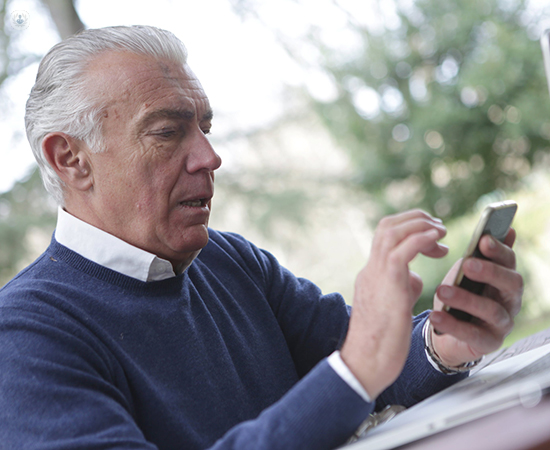Men's health: top causes of blood in the urine
Written by:In men, there can be a range of different possible causes of blood in the urine whether that’s from a urinary tract infection (UTI), problems with the prostate or cancer. We spoke to one of our leading consultant urologists Mr Sam Datta about the commonest causes and how blood in the urine is investigated for a diagnosis.

What are some of the most common causes of blood in the urine?
There are two different types of blood in the urine; non-visible haematuria, which can be detected with a dipstick test at your GP surgery, or visible haematuria. The second type, where you actually see blood in the urine is the reason why most people worry.
There is a one in five chance of blood in the urine being caused by cancer, which could be from the kidney, ureter (pipes from the kidney) or the bladder. The other possible causes of blood in the urine could be the kidney (kidney stones, infection), prostate or trauma.
Who does this most commonly affect?
Blood in the urine can affect both men and women of any age. It tends to occur in adults, and it is not so common in children. The worry is when it occurs in people who smoke or those who are exposed to chemicals, heavy metals, or industrial smoke. Those in the above 50s age group are also at risk.
What other symptoms may be present?
Patients either present with pain or without. When it presents as painless blood in the urine, it is more worrying as a sign of cancer. The pain could be caused by an infection, blockage, or by kidney stones.
There are other symptoms that can come with a kidney infection, such as burning when urinating and pain in the loins. Prostatitis may present as a burning sensation or throbbing pain between the legs too.
When should someone go to the doctors or hospital about blood in their urine?
Anyone who sees blood in their urine should visit their doctor as it may be indicative of cancer and an earlier diagnosis is really important. If your GP detects invisible blood in the urine using a dipstick, they will repeat the test in three or four weeks to check if it still there. If two dipstick tests are positive, then you should be referred to a specialist for further testing.
Can this clear up on its own?
Yes, blood in the urine can clear up on its own, but this depends on the cause. If it is a kidney stone, for example, the stone may pass and you clear the blood, or the infection is treated. But if it’s cancer, it won’t go away.
How will the cause be diagnosed?
Blood in the urine is usually diagnosed by a dipstick test or seeing it physically. Your doctor will send off your urine sample to a laboratory and there will be a report to say if there is blood present.
What are the most common investigations of blood in the urine?
Investigations include a physical examination, flexi cystoscopy or prostate examination. Another common investigation is a CT urogram where special dye enters into and looks at the urinary system to show if anything is wrong with kidneys, bladder and ureters.
Mr Datta specialises in treating prostate cancer, kidney stones, UTI, blood in the urine and bladder problems. Book an appointment with him via his Top Doctor’s profile here for his expert medical opinion in your case.


